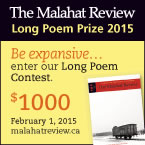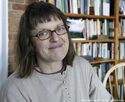Enter the Long Poem Prize
 Deadline: February 1, 2015 (postmarked) Deadline: February 1, 2015 (postmarked)
Prize: $1,000 each to two winners
Entry fee:
$35 CAD for Canadian entries
$40 USD for entries from the USA
$45 USD for entries from elsewhere
Additional entries are $15 CAD (from anywhere).
The Malahat's biennial Long Poem Prize is now open!
While the deadline is still a 'long' way away (February 1, 2015), we encourage you to start writing before the holidays sneak up. How long is a long poem? We're looking for a single poem or cycle of poems that is between 10 to 20 pages long. No restrictions as to subject matter or aesthetic approach apply.
A prize of $1,000 will be given to two winners. Each winner be interviewed for the website, and selected pieces will be published in the Summer 2015 issue of The Malahat Review.
Three judges will make the final cut: Evan Jones, Anita Lahey, and Alice Major (interviews below).
Full contest guidelines available on the Malahat website.
Long Poem Prize Judges
Anita Lahey
 Malahat volunteer Tyler Gabrysh talks with Anita Lahey about the value of the long poem and writing contests, and what poetic elements should stand out in a winning entry. Malahat volunteer Tyler Gabrysh talks with Anita Lahey about the value of the long poem and writing contests, and what poetic elements should stand out in a winning entry.
TG: As a previous winner in contests such as the The Antigonish Review’s Great Blue Heron Poetry Prize, and now as a judge in the Malahat’s Long Poem Prize, do you believe that in any poetry competition, the longer work is generally favoured, and if so, why?
AL: In most cases I think judges strive to read a given entry on its own terms with regards to style, subject matter, form, length and other factors. But there is a danger, I think, when reading the many submissions that come in, for shorter, snappier poems that offer a quicker satisfaction, even a kind of punch, to stand out. This is not systemic; it is a hazard most judges (I hope) are aware of and try to guard against. The Malahat’s Long Poem Prize, calling explicitly for longer work, functions as an antidote to this, at least with regards to the matter of length.
Read the rest of Anita's interview on the Malahat website.
Evan Jones
 Malahat volunteer Megan Welsh talks with Long Poem Prize judge Evan Jones about the value of the long poem and writing contests, and what he's looking for in a winning entry. Malahat volunteer Megan Welsh talks with Long Poem Prize judge Evan Jones about the value of the long poem and writing contests, and what he's looking for in a winning entry.
MW: Have you judged in poetry competitions before? What do you find most challenging about such an undertaking, and oppositely, what are the rewarding moments for you, as a critical reader?
EJ: I have judged a poetry competition or two. What I like best about the experience is that the winner is always a surprise. Whether judging alongside others or not, the range and variety of poetries right now always undermines preconceived notions and tastes. That’s a thrill, in its way, and a discovery. The challenge is the disappointing fact that not all poems can win a prize. What if there are two or three poems that have equal yet different strength?
Read the rest of Evan's interview on the Malahat website.
Alice Major
 Malahat volunteer Melissa Stephens talks with Long Poem Prize judge Alice Major about the science of her work, the value of the long poem and writing contests, and poetry as communication. Malahat volunteer Melissa Stephens talks with Long Poem Prize judge Alice Major about the science of her work, the value of the long poem and writing contests, and poetry as communication.
MS: Are there any worn-out conventions that you’ve noticed about long poetry? Are there any innovations in the form that excite you?
AM: Oh, well, maybe the desperate need to be unconventional can be a bit tiring. All art is about engaging with convention in some way or another; I don’t think there are any conventions that are inherently more “worn-out” than any others as long as you meet the challenge of using them to create something interesting.
Read the rest of Alice's interview on the Malahat website.
Translation Issue Interview: Erín Moure on Poetry
 Malahat volunteer Robin Reniero talks with Erín Moure about her translation of Galician poet Chus Pato and co-translation with Roman Ivashkiv of Ukrainian poet Yuri Izdryk in Issue 188: At Home in Translation. Malahat volunteer Robin Reniero talks with Erín Moure about her translation of Galician poet Chus Pato and co-translation with Roman Ivashkiv of Ukrainian poet Yuri Izdryk in Issue 188: At Home in Translation.
RR: What inspired you to translate works from French, Spanish, Portuguese, and Galician?
EM: They are the languages I am competent to translate from. I started with French as it is the language of where I live, Montreal, and I learned Galician to translate Chus Pato and because I wanted to be a new speaker of a language that was small and losing speakers, to help ensure its vitality. Learning a language is a gesture of trust and love. Then, as a speaker of Galician, I discovered I could read Portuguese (they are related languages, Galician being the root of modern Portuguese), and because Galician is spoken in an area of the Iberian Peninsula long colonized by the Spanish State, I learned Spanish by osmosis and absorption.
Read the rest of Erín's interview on the Malahat website.
2014 Creative Nonfiction Prize Winner Interview: Rebecca Foust
 Malahat volunteer Jake Hólm talks with Rebecca Foust, 2014 winner of the Constance Rooke Creative Nonfiction Prize, about her memoir, "Venn Diagrams," chosen from over 160 entries by contest judge Priscila Uppal. Foust discusses truth, memory, and the balance between hot subject matter and cool tone. Malahat volunteer Jake Hólm talks with Rebecca Foust, 2014 winner of the Constance Rooke Creative Nonfiction Prize, about her memoir, "Venn Diagrams," chosen from over 160 entries by contest judge Priscila Uppal. Foust discusses truth, memory, and the balance between hot subject matter and cool tone.
JH: While I hesitate to describe the voice as disconnected—in light of the information you share with readers—your prose doesn’t seem to make much room for the complex emotive response that such a powerful memoir naturally evokes. Where would you say that the matter-of-factness of your writing springs from, and what does it bring to bear on the piece as a whole?
RF: This is an interesting question. I am quite certain that any matter-of-factness in my tone is a result of the effort I have always made not to allow treatment of highly emotional subject matter to veer into melodrama or pathos. One of my writing teachers taught me early on—it may have been John Garner talking in The Art of Fiction, or it may have been poet C. Dale Young talking in a grad school workshop—something along the lines of: “the hotter the subject matter, the cooler the tone should be.”
Read the rest of Rebecca's interview on the Malahat website.
|